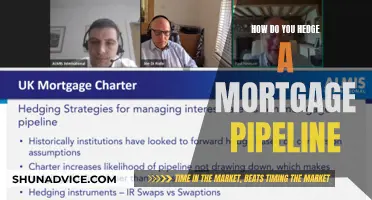
A mortgage field inspector plays a critical role in the real estate and mortgage industry by conducting inspections of residential properties to assess their condition and compliance with mortgage and insurance requirements. To become a mortgage field inspector, you don't need a college degree, but most employers will require a high school diploma or GED, as well as reliable transportation, equipment such as a camera, and strong communication skills. You will likely receive on-the-job training, and some companies may require additional certifications and training courses. This career offers flexibility and the opportunity to work as an independent contractor, allowing you to manage your own schedule and work with multiple companies.
| Characteristics | Values |
|---|---|
| Education | No higher education is required, but most employers will require a high school diploma or GED |
| Training | On-the-job training is provided by the employer, but some companies also require certifications or training courses in addition to the initial training |
| Skills | Excellent communication skills, strong work ethic, research skills, investigative mindset, writing skills, attention to detail, time management skills, knowledge of real estate, familiarity with building codes and regulations |
| Equipment | Reliable transportation, a smartphone or camera, a computer, a printer, and internet access |
| Work Type | Independent contract work, flexible schedule, travel to various locations |
| Responsibilities | Conducting inspections of residential properties, documenting findings, providing reports to lenders, insurers, and other stakeholders, assessing property occupancy, evaluating property condition, verifying compliance with safety codes and regulations |
| Salary | N/A |
What You'll Learn

Qualifications and training
To become a mortgage field inspector, you'll need a combination of relevant qualifications, training, and experience. While the specific requirements may vary depending on your location and the company you aim to work for, here's an overview of the typical qualifications and training you'll need:
Education and Qualifications:
Although there are no standard educational requirements to become a mortgage field inspector, most companies and clients prefer candidates with a high school diploma or GED. Some companies might also accept candidates with equivalent work experience in a related field, such as You may want to see also To become a successful mortgage field inspector, you must possess a variety of skills and attributes. Here are some of the key qualities you'll need: Attention to Detail Mortgage field inspectors must be detail-oriented and have a sharp eye for spotting potential issues such as damage, vandalism, or code violations during property inspections. They need to accurately document property conditions, take photos, and write detailed reports. Time Management Effective time management and organizational skills are crucial to succeed in this role. Mortgage field inspectors often handle multiple assignments and must meet inspection deadlines. They need to plan their routes efficiently and adapt to changing schedules and travel requirements. Communication Skills Excellent verbal and written communication skills are essential for interacting with clients, property managers, and stakeholders. Clear and concise communication ensures that all parties involved understand the findings and recommendations of the inspection report. Technical Skills Mortgage field inspectors should be proficient in using digital devices, cameras, and computer software for data entry, report generation, and uploading photos and reports online. Basic knowledge of Microsoft Office Suite (Word and Excel) is typically required. Research and Investigative Skills Strong research skills are necessary to uncover information from public records and conduct thorough inspections of properties. Mortgage field inspectors must be able to locate and inspect properties, assess their condition, and verify occupancy. Knowledge of Real Estate and Building Codes Familiarity with real estate, mortgage, and insurance industry standards, regulations, and building codes is advantageous. Understanding the principles of the mortgage field services industry and the roles and responsibilities of an inspector are important for making informed decisions and recommendations. You may want to see also A mortgage field inspector is responsible for evaluating the condition of properties that are in foreclosure or delinquent on mortgage payments. These inspections help mortgage lenders and insurers determine whether the property is a good investment and whether any repairs or maintenance need to be conducted. Mortgage field inspectors are typically contracted by banks, mortgage lenders, and home insurance companies to gather information about houses, apartment buildings, commercial buildings, and other mortgaged properties. The inspector's role is to serve as the eyes and ears of these institutions, providing them with detailed reports and photographs of the properties in question. The specific job responsibilities of a mortgage field inspector include: You may want to see also Mortgage field inspectors are needed across various locations in the US. You can find work with companies that contract out their services to banks, such as home inspection or mortgage service companies. You could also find positions working directly for an insurance company or bank. The availability of work depends on the demand for inspections in your area and the number of contractors the company employs. Most field inspectors are independent contractors, so work may not be steady or guaranteed full-time. You may find it helpful to work for more than one company if you don't have a full workload. You can also choose to work with multiple companies if you want to increase your income streams and diversify your work. Some companies require inspectors to obtain additional qualifications, such as certifications and training courses. You can find free courses online that will certify you as a Mortgage Field Service Inspector. These courses are often created by business owners and provide a general understanding of how to conduct property inspections. Some companies also provide their own training courses, which are sometimes mandatory for employment. To get started, you can fill out a Vendor Inquiry Form on the company's website. This form collects information about your background, skills, and availability. If your experience matches the company's needs, they will likely contact you to schedule a phone interview. During the interview, you can learn more about the role and the company can learn more about your skills and qualifications. You may want to see also Mortgage field inspectors are independent contractors and are paid as such. They are responsible for their own taxes and can deduct business expenses such as mileage, cell phones, internet, printers, ink, paper, and home offices. While there is no guarantee of full-time or steady work, some inspectors have enough work to make it their full-time job. The ease of finding work as a field inspector depends on the demand for inspections in your local area and the number of other qualified inspectors in your community. Some companies, like NFR, offer competitive pay and quick payments. They also offer the flexibility to choose assignments that fit your availability, helping you maintain a good work-life balance. Mortgage field inspectors do not require higher education, but most employers will likely require a high school diploma or GED. You will need reliable transportation, equipment such as a camera and a computer, excellent communication skills, and a strong work ethic. You will also need strong research skills to uncover information in public records, an investigative mindset to find and inspect properties, and good writing skills to prepare reports about properties for their employers. There are also free courses available for independent contractors to learn how to conduct inspections properly. These courses can be useful in gaining a solid understanding of the principles of the mortgage field services industry and are considered a prerequisite by some hiring companies. You may want to see also You do not need a college degree to become a mortgage field inspector, but most employers will require a high school diploma or GED. Some companies also require additional qualifications, such as certifications and training courses. You will need strong research skills, an investigative mindset, and good writing skills. You should also be reliable, hardworking, and independent, with good time management and communication skills. You will need reliable transportation, such as a car, as well as a smartphone or camera to take pictures of properties, and a computer to write and submit reports.Strategies for Managing Multiple Mortgages and Financial Freedom

Skills and attributes
FHA Mortgage Assumption: What You Need to Know

Job responsibilities
Becoming a Licensed Mortgage Originator in Texas

Finding work
Attaching a Judgment Mortgage: A Comprehensive Guide

Payment and benefits
Cashing Out Refinance Mortgages: Strategies for Homeowners
Frequently asked questions







